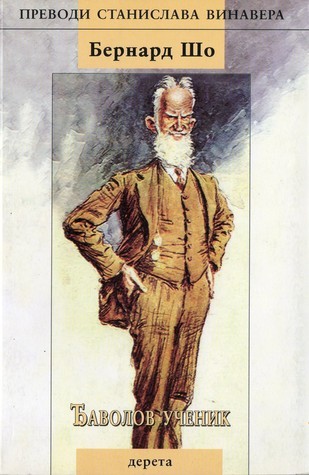What do you think?
Rate this book


138 pages, Paperback
First published January 1, 1897

BURGOYNE (with extreme suavity)...You will understand, sir, I hope, since you seem to be a gentleman and a man of some spirit..., that if we should have the misfortune to hang you, we shall do so as a mere matter of political necessity and military duty, without any personal ill-feeling.
RICHARD. Oh, quite so. That makes all the difference in the world, of course..
SWINDON. You are aware, I presume, Mr. Anderson, of your obligations as a subject of His Majesty King George the Third.
RICHARD. I am aware, sir, that His Majesty King George the Third is about to hang me because I object to Lord North's robbing me.
SWINDON. That is a treasonable speech, sir.
RICHARD (briefly). Yes. I meant it to be.
BURGOYNE (strongly deprecating this line of defence, but still polite). Don't you think, Mr. Anderson, that this is rather—if you will excuse the word—a vulgar line to take? Why should you cry out robbery because of a stamp duty and a tea duty and so forth? After all, it is the essence of your position as a gentleman that you pay with a good grace.
RICHARD. It is not the money, General. But to be swindled by a pig-headed lunatic like King George.
SWINDON (scandalised). Chut, sir—silence!
SERGEANT (in stentorian tones, greatly shocked). Silence!
BURGOYNE (unruffled). Ah, that is another point of view. My position does not allow of my going into that, except in private... But (shrugging his shoulders) of course, Mr. Anderson, if you are determined to be hanged...there's nothing more to be said. An unusual taste! however (with a final shrug)—!...
SWINDON...Have you anything more to say?
RICHARD. I think you might have the decency to treat me as a prisoner of war, and shoot me like a man instead of hanging me like a dog.
BURGOYNE (sympathetically). Now there, Mr. Anderson, you talk like a civilian, if you will excuse my saying so. Have you any idea of the average marksmanship of the army of His Majesty King George the Third? If we make you up a firing party, what will happen? Half of them will miss you: the rest will make a mess of the business and leave you to the provo-marshal's pistol. Whereas we can hang you in a perfectly workmanlike and agreeable way. (Kindly) Let me persuade you to be hanged, Mr. Anderson?...
RICHARD...Thank you, General: that view of the case did not occur to me before. To oblige you, I withdraw my objection to the rope. Hang me, by all means.



I prayed secretly to him; and he comforted me, and saved me from having my spirit broken in this house of children's tears. (…) From this day this house is his home; and no child shall cry in it: this hearth is his altar; and no soul shall ever cower over it in the dark evenings and be afraid.
BURGOYNE. Mr. Dudgeon: we are only doing this—
RICHARD. Because you're paid to do it.
SWINDON. You insolent— (He swallows his rage.)
BURGOYNE (with much charm of manner). Ah, I am really sorry that you should think that, Mr. Dudgeon. If you knew what my commission cost me, and what my pay is, you would think better of me. I should be glad to part from you on friendly terms.
RICHARD. Hark ye, General Burgoyne. If you think that I like being hanged, you're mistaken. I don't like it; and I don't mean to pretend that I do. And if you think I'm obliged to you for hanging me in a gentlemanly way, you're wrong there too. I take the whole business in devilish bad part; and the only satisfaction I have in it is that you'll feel a good deal meaner than I'll look when it's over.